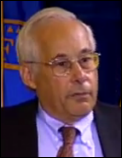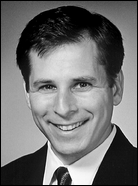Neither of those sound like good news for Oracle Health. After the lofty proclamations of the last couple years. still…
News 7/14/10
From CernerDoesItToAnutherExec: “Re: Trace Devanny. He’s leaving Friday. He was shipped by Neal to France early this year, which is like getting dead fish in the Sopranos. Unlike the last 5-7 execs, it looks like Trace left on his own.” Too bad I don’t usually post news on Monday since that’s when this came and I’d have had a scoop. As I said on February 12 when Cerner announced his transoceanic relocation, “It seems curious that Cerner would allow its president to live and work overseas when only a tiny bit of its business comes from there, so I’m guessing there is more to that story.” It was nice timing to release not-so-positive company news on the day of Meaningful Use’s rowdy debutante ball (and not only just ahead of the earnings announcement, but “to pursue other opportunities” that apparently start just three days from now – hmmm). They’ve already removed him from the Web site. Neal will now hold all the Cerner titles – president, CEO, and chairman of the board. His Pie is secure.
From Jacob Black: “Re: Daniel Barchi interview. I guess Epic has a very closed system like Apple, but the similarities stop there. I think one of the problems with HIT today is that there are too many Microsofts raking in the implementation fees and we desperately need an Apple to shake things up. I think we’ll see one arrive in the next 24 months, and when it does, it will be a game-changer.”
From Dr. Boogie: “Re: Gibson General Hospital, Indiana. Medicare fraud.” The fired hospital CFO goes whistleblower.
From Ms. MarCom: “Re: Meaningful Use. All I can say is WOW. You have totally blown away any publishing competition this morning, both from a posting standpoint and from a speed of analysis standpoint. WOW! Great job!” I replied back to Ms. M that I would treasure her nice words, especially if I got fired for spending a couple of hours digging through the MU rule instead of working for the hospital whose clock I was on at the time. I don’t know if my employer would buy the industry service argument that I had rationalized. Our only plan for the day was that Inga would sit in on the Webinar, so it was impromptu.

From Ivo Nelson: “Re: consulting company life cycle. I’m going to take offense to your comments regarding your life cycle for consulting firm buy-outs. What you failed to mention was that some of us build our businesses on delivering for clients. That delivery creates trust that leads to more business. It takes years, if not decades to build the level of trust needed to be in the ‘inner circle’ of the CIOs. Most of them aren’t stupid and don’t just buy the current consulting fad; rather, they hire firms they trust and respect knowing these decisions can be career-limiting if it leads to a bad implementation. The reality of our business goes well beyond the spin. In my world, there’s an intermediate step that few of the hundreds of consulting firms that start up in this space ever achieve — that is widespread respect and trust that only happens through the grind of delivering on projects year end and year out. Trust doesn’t happen through spin.” Ivo knows I was being tongue-in-cheek. He’s right that a consulting company doesn’t grow enough to be an acquisition target unless they do things very, very well, like he did with Healthlink and is doing again with Encore Health Resources. My ribbing was aimed more at the companies (usually hardware vendors) that buy them thinking it looks like easy, high-margin money compared to moving iron.
And now, the obligatory Meaningful Use news and reaction.
Notice that during the press release (video above) that Kathleen Sebelius started off by botching the name of CMS, calling it the Centers for Medicaid and Medicare Services (backwards). That makes about as much sense as making its acronym CMS instead of CMMS, but I can’t swear I’d say it right either if facing a ton of cameras.
Inga has collected some thoughts and comparisons about the proposed vs. final Meaningful Use rule. She’s Meaningfully Used up, so help her out by adding a comment to that post with anything she missed.
Everybody with skin in the Meaningful Use game will be cranking out press releases extolling their love or hatred for what’s been passed. Thos who love it so far: Allscripts, AARP, UnitedHealth Group, Medsphere, AHIP. Those who hate it: American Hospital Association. I’m sure PR people are proofing a lot more press releases yet to come. In fact, CHIME issued a press release that said they are “actively reviewing the changes” and will publish its summary “once CHIME has thoroughly reviewed the 864-page rule.” I shall alert the media. Oh, wait, they already did.
Don Berwick’s first day on the job involved participating in the Meaningful Use press briefing. He reminded everybody about President Obama’s goal to for every American to have electronic medical records by 2014, which was probably a mistake since, like a lot of other ambitious administration goals, it’s clearly not going to happen just because of some stirring oratory. Inga speculates that the President rushed Berwick’s confirmation through so DB could look authoritative on his first day and use the opportunity to meet and greet. To me, he comes across as likeable and sincere.
Announced: the House Ways and Means Subcommittee will review the guidelines next Tuesday.
Check out Page 34: “We expect to update the meaningful use criteria on a biennial basis, with the Stage 2 criteria by the end of 2011 and the Stage 3 criteria by the end of 2013.”
My reaction to the rule: it’s a nicely done compromise. The really contentious areas were scaled back, and even in areas that weren’t, thoughtful rationale was provided. Breaking out the requirements into the mandatory vs. elective requirements was a great idea. CMS was smart to start tough in the proposed rules and then ease up after taking public comments into account. Some folks will still think the bar is set too high, but nobody’s putting a gun to anyone’s head to take the thousands to millions of otherwise free taxpayer dollars. If you don’t like the gift horse, don’t ride it.
What’s the biggest surprise in the final Meaningful Use guidelines? That doctors don’t have to actually enter any orders to meet the CPOE requirement. Anybody allowed to write orders can do it for them. That should goose the medical scribe job market. I think CMS got a little too user-friendly with that change since the next most important number other than overall percentage of orders entered via CPOE is the number that are entered directly by the physician instead of entered on their behalf as verbal or written orders by nurses (which opens the door right back up to transcription errors – the whole “readback” thing is lame). Also, anybody who implements clinical decision support thinking that the nurse will sift through the on-screen warnings and pass the important ones to the doctor knows how poorly that works.
I loaded the government’s PDF to Scribd as soon as a reader sent me the link this morning (thanks!) I see that file has received 2,177 reads so far. I don’t think HIStalk will set a one-day reader record, but it’s had 6,000 visitors so far (early Tuesday evening Eastern time). Needless to say, MU interest was high.
I e-mailed John Glaser to get his thoughts since he was instrumental in putting MU together. He thinks the best part was that they listened to industry concerns about flexibility and setting the bar too high. I told him he should get a completion bonus of the billions, of which he humbly suggested 1%. He also offered this piece:
The Big Day
On Tuesday (7/13/10) the final Meaningful Use regulation was released as was the final Standards and Certification Criteria regulation.
Arriving at the release of these regulations took time and an impressive amount of work. The regulations appeared 17 months after the passage of ARRA and 14 months after the first meetings of the Policy Committee and Standards Committee. Hundreds of hours were spent by volunteers of the Policy and Standards committees and their workgroups. Thousands of comments were written by organizations and individuals and read by dozens of federal staff. Some very large number of blog comments, articles and white papers were prepared by consultants, academics, vendors, practitioners and others. And an incalculable number of hours were devoted by staff at ONC, CMS, OMB and other federal agencies and departments.
All of this resulted in over 1,000 pages of regulations. Regulations that will bring tens of billions of dollars into healthcare and promise to significantly improve the care of patients. Healthcare in this country was forever changed on Tuesday. Those of us who work in the industry have not seen a day as momentous as this and may not see one again.
There are many individuals whose efforts brought us to this point. David Blumenthal. Farzad Mostashari. Tony Trenkle. Paul Tang. Jon Perlin. John Halamka. But I wanted to single out one person – Janet Marchibroda.
Janet was the founding CEO of the eHealth Initiative (eHI). For many years the eHealth Initiative has brought together a diverse group of stakeholders to develop strategies, author example policies, compile lessons learned and provide education to further a vision – significant improvements in care through the adoption and effective use of interoperable electronic health records. Years before there was an ARRA, eHI and Janet were relentless in their pursuit of this vision and they were remarkably effective in bringing their ideas to Congress, the Executive Branch, state governments and the industry. While not the only voice in the early days of this undertaking they were an exceptionally effective voice. You could clearly argue that Janet and eHI are one of the primary reasons that HITECH was included in the ARRA legislation in the first place.
Congratulations Janet. This day must be very sweet.
I hear that Eric Rose, medical director of McKesson Physician Practice Solutions, has signed on with Microsoft’s Health Solutions Group to work on global health technology offerings.
A reader tells me that a Vermont hospital’s practice EMR has been down for two days so far after its vendor tried to apply an upgrade, apparently mistakenly loading the 64-bit version instead of the 32-bit. They had to go to backup, and everybody could have predicted what happened next: the backup was no good. I guess downtime doesn’t get you Meaningful Use credit.
St. Joseph Health System (CA) chooses periop and anesthesia systems from Picis for its 13 facilities. A couple of readers have sent over positive rumor reports about Picis lately, so without my speculating about the details, I expect to hear news shortly.
Listening: The Doors, because I was watching the mediocre, Johnny Depp-narrated When You’re Strange on Netflix and got stoked about them all over again (actually, it was pretty good other than Johnny). May favorite Doors tunes: Crystal Ship; Yes, the River Knows; Not to Touch the Earth; The Unknown Soldier; and When the Music’s Over. Mr. Mojo Risin’ has been dead for nearly 40 years, but his digital detritus remains vibrant and essential. We should all be so lucky.
Consumer Reports says it can’t recommend the iPhone 4 because of its notorious antenna problems, saying Apple should fix its own phone instead of telling owners to buy themselves a case (or use duct tape like CR recommends) to prevent touching the antenna and thereby drop signal strength. The iPhone scored at the top of its ratings otherwise.
If you clicked the e-mail link to read this post, you’ll notice a single sponsor ad at the very bottom, right before the comments. That was the brainchild of a couple of readers who felt guilty that they don’t always look over the ads in the left column, but who said they’d pay significant to attention to a single strategically placed one. All sponsor ads get an equal chance – it’s a random display for each page view. Thanks for the idea and for supporting HIStalk’s sponsors.
Speaking of sponsors, thanks to new HIStalk Gold Sponsor My Health Direct. You’ll recall that I interviewed CEO and Chairman Jay Mason a few weeks back. The best way to describe the company’s offering is as “OpenTable for Healthcare”, a SaaS application that connects patients (usually ED ones) with provider appointments in the community. The system searches open provider appointments and manages the mix of low-paying reimbursement those providers are willing to accept. It also increases compliance with follow-up visits since patients leave the ED with a firm appointment. Thanks to My Health Direct for supporting HIStalk and its readers. And in case it looks suspicious, I promise there was no discussion about sponsorship when we did the interview. I often interview somebody who is then overwhelmed by the “hey, I saw your picture on HIStalk” feedback they get afterward from the very cool HIStalk readership, so they send the marketing people my way.
Weird News Andy loves his UK stories, of which this one is big: NHS will restructure and take hospitals out of the system, eliminating all 10 strategic health authorities and the 152 primary care trusts in favor of local control answering to an independent NHS board. Their private income was previously capped. From the video: “Our guiding principle will be no decision about me, without me.” Sounds like the opposite of what we’re doing here. I wonder if Don Berwick admires them more or less now?
Interoperability vendor Holon announces GA of its Medication Management Solution, which accepts electronic or scanned orders and routes them via a workflow scheduler.
Healthcare claims processor and cost management vendor MultiPlan will be acquired by private equity investors in a deal valued at $3.1 billion. You just know you’ll see more of this as investors lick their chops at the profitable administrative overhead sure to be introduced by healthcare reform (irony intentional). Surely nobody thinks insurance companies and their lobbyists will voluntarily find another line of work.
Iowa HITREC chooses Greenway’s PrimeSuite EHR.
Dentrix Enterprise Dental Practice Management earns certification as an electronic dental record solution for the Indian Health Service.
Kronos introduces its new Rich Internet Applications. I had to look that up – it means Web apps that work like desktop apps by using browser plug-ins or virtual machines. Gmail is an example.
It’s not exactly poverty-vowing nuns running hospitals: Wayne Smith, CEO of publicly traded hospital operator Community Health Systems, took home $17.8 million in compensation last year.








I had just started reading the follow up thoughts on meaningful use and thought “I wonder what John Glaser thinks?”. Ok, I’ve been reading about him (here mostly) for what seems like a number of years and soon I’ll be one of his employees. I really liked that he went out of his way to notice everyone else that did all the hard work ;), since he had nothing to do with any of this…. And I have to say, I (and I think many others I know) are looking forward to the future working with this guy. Even those of us way down in the trenches. John, please keep writing no matter what they say way on the other side of the pond….
I take offense at your Johnny Depp remark. Johnny Depp is never mediocre. Sheesh.
[From Mr. HIStalk] I’ll assume you haven’t seen this movie and his “me trying to sound moody like Jim Morrison” sullen narration.
Agree with Ivo. There is a right way and a wrong way to do everything. Consulting has its place and “grinding it out” to solve your client’s problem is the right way. Wish more IT vendors understood that concept. Just because some college kid tells you your software is lit up doesn’t mean the enterprise has been well served.
I would like to echo what Ms. MarCom said, the live blog was fantastic. Very useful to the people who had a full day and couldn’t spend too much time reading the full document.
Re Jacob Blacks comments; Where to start on this? Clearly somebody who doesn’t really understand the complexities of the industry. Fresh out of college or an MBA CIO? Obviously broad generalizations and contradiction in just a few sentences. He appears to be advocating a “plug and play” EMR, while calling EPIC a closed system in a negative way. Wha? Firstly EPIC is far from a closed system. Anybody with even a small amount of knowledge would know that. Interconnect, EPIC’s SOAP implementation, Bridges an extremely customizable HL7 implementation all beg to differ. But a switch on and it works EMR? Legacy systems that are 5 revisions of the software behind, years of customization, in house development, the pesky “our Physicians and nurses want it to work this way” problem. 12 year old device with old firmware, that imaging solution purchased after a game of golf. They are literally hundreds of devices, imaging systems, billing systems, interface engines, lab systems that would all need to be supported by this plug and play system. That’s more like Microsoft who support any printer/scanner/joystick/usb cup heater/ you may want. Apple would force you to buy a new iPad compatible device, it wont work very well, so you go out and buy an Apple version of it 🙂 It’s easy to have a romantic view and simplify the industry. It’s very easy. It’s far more difficult to actually carry out some of the work and deal with the very real complexities inherent to the realities we face every day.
But in the spirit I will offer my own prediction. I think there will be a time machine created in the next 24 months. We can just go back in time alter peoples habits to improve their health. When this happens, it will be a game changer. I ROCK AT THIS!
I think “Moonlight Drive >Horse Latitudes> Moonlight Drive” on Alive She Cried is one of the best set closers ever. Hard to beat the first album or Morrison Hotel. Thanks for hijacking my music today while I pour over MU manna.
RE: CPOE in MU, the requirement is for “licensed healthcare professionals” not just anyone designated by physicians. These could include nurse practitioners, physician assistants, CRNAs, for example, depending on the state. Most organizations already consider them authorized providers for the purposes of measuring CPOE adoption. Here’s the exact language:
“Use CPOE for medication orders directly entered by any licensed healthcare professional who can enter orders into the medical record per state, local and professional guidelines”
PORT-AU-PRINCE, Haiti (July 13) – Two months ago, Dr. Reynold Savain was the director of the most state-of-the-art hospital in this country. Now, he walks the empty corridors of the 43,000-square-foot Centre Hospitalier du Sacre-Coeur with a stunned expression.
See http://www.aolnews.com/haiti-six-months/article/state-of-the-art-hospital-that-helped-haiti-earthquake-victims-closes/19547148
for interesting article.
I would submit the game-changer is already here. It’s intuitive, easy, it works, and users love it. Blows the pants off the competition. Name? SRSsoft.
Echoing Dr. Velasco’s comment, I think scribes would not be allowed to enter orders via CPOE.
[From Mr. HIStalk] I was not thinking of unlicensed people, but whatever the lowest level of licensed person is in a given state (RN, LPN, MT, etc.). A hospital could hit its CPOE number by getting the cheapest available licensed professional and making them an order entry clerk.
>Inga speculates that the President rushed Berwick’s confirmation through
Mr. Berwick was a recess appointment by President Obama, he did not take part in a Senate confirmation process. According to law, a recess appointment is valid until the next congress is seated. That’s in January, 2011. At that time, he can resign (as John Bolton, a G.W. Bush UN Ambassador recess appointment, did) or he can, as I suspect will happen, ignore the law. President Obama would have the option to submit his name for the position when the new congress is seated, and Mr. Berwick would be subject to the confirmation process.
Re: It’s not exactly poverty-vowing nuns running hospitals AKA publicly traded health system CEO’s outrageous compensation
Is anyone besides me concerned about the level of compensation these healthcare executives rake in?
How do you suppose the general public feels about millions of tax dollars being provided to improve healthcare while these execs become millionaires?
Does anyone remember the bank industry collapse?!
Now shame on you, you know this defeats the unproven safety purpose of CPOE proposed by the Leapfrog Group for Safety, Berwick, CMS, ONC, C$HIT, HIM$$ : “[From Mr. HIStalk] I was not thinking of unlicensed people, but whatever the lowest level of licensed person is in a given state (RN, LPN, MT, etc.). A hospital could hit its CPOE number by getting the cheapest available licensed professional and making them an order entry clerk.”
The “P” in CPOE is for “physician”, not secretary. If they wanted a secretary, they could have called it CSOE.
Your workaround in ingenious, Mr. Histalk.
Gee, I am glad somebody is not tired of me.
I caught the Sebelius glitch. “Notice that during the press release (video above) that Kathleen Sebelius started off by botching the name of CMS, calling it the Centers for Medicaid and Medicare Services (backwards).”
At least her glitch does not kill patients as do the glitches on the unusable devices that she demands be meaningfully useful when they are not approved by the FDA.
She seemed nervous. She knows what she is doing is in violation of the F D and C Act. It is being subverted by HHS. She is making a mockery of patient safety.
Blah writes:
I think there will be a time machine created in the next 24 months. We can just go back in time alter peoples habits to improve their health. When this happens, it will be a game changer. I ROCK AT THIS!
I have a time machine, but it’s broken and in the shop for repairs.
For some reason, they’re having problems getting parts. (It may have something to do with the parts not having been invented yet.)
“…any licensed healthcare professional who can enter orders into the medical record per state, local and professional guidelines”
No workarounds here, I’m afraid. These are folks with prescribing rights “per state”. It does differ by State, but it cannot be anything less than physicians, NPs and PAs. None of those are cheap enough to utilize as scribes.
When my doctors order a GI consultation, they want a doctor to be thinking and entering the orders, not a PA or NP (with a year or two of schooling), who charades as a doctor (the patients can not tell the difference) in the long white coat but enters orders under the doctors’ names while they are too busy to take charge while scoping for dollars in the GI lab. What has become of this profession?
Mary, this is for medication orders ONLY.
Every other type of CPOE has been removed from the requirements for now.
These folks have prescribing rights in most all States. It will be interesting to see how the language changes in 2011 when other types of CPOE are included.
Only a hospital that wants to open itself up to more than the usual number of lawsuits by patients would allow doctors to dictate orders and not at least review and sign off on them in CPOE. A computer system can be devised to meet the needs of any hospital but the hospital must set controls for safety such as having doctors input and sign off on orders. They do and must at the University of Michigan Hospital.
Margalit,
What do you mean by: “Every other type of CPOE has been removed from the requirements for now”?
What we are finding is that nurses and NPs and PAs are entering orders denovo or as verbal from the doctor, and because of the wordiness and confusing screens of signing off on verbal orders, the docs are blowing through them quickly and signing without the critical read. If they choose not to sign, that opens an entire can of worms, which does one thing for sure: WASTE TIME!
Margalit,
RE: “when other types of orders are included”
FYI, CMS went ahead and finalized the Stage 2 measure for CPOE in this rule, limiting the order types to medications only:
“…we believe it is reasonable to expect providers to move to a
60 percent threshold at Stage 2 of meaningful use. Thus, for this measure, we are finalizing, for Stage 2 of meaningful use, that EPs, eligible hospitals and CAHs must meet a 60 percent threshold for CPOE. Therefore, we are finalizing a Stage 2 measure for CPOE at §495.6(h) for EPs and §495.6(i) for eligible hospitals and CAHs as “More than 60 percent of all unique patients with at least one medication in their medication list seen by the EP or admitted to the eligible hospital’s or CAH’s inpatient or emergency department (POS 21 or 23) during the EHR reporting period have at least medication one order entered using CPOE”.”
(from p. 80; note the grammatical error: the last sentence should read “one medication order entered using CPOE”)
Suzy,
Regardless of the current CPOE situation, CMS is not requiring that anything other than medications is ordered in the CPOE module. Per Dr. Velasco, this is going to hold true for Stage 2 as well. ( I must have missed that one).
So whatever else the nurses enter, or not, is not required for the incentives to be paid out. I presume it is probably required by the hospital administration.